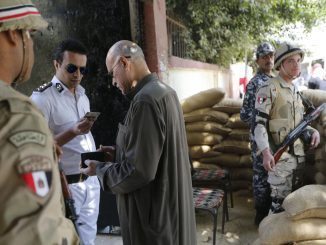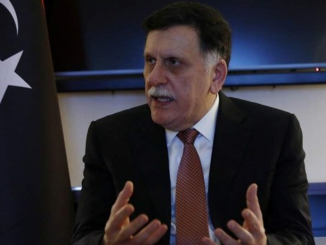
Zambia has seized a private plane coming from Egypt carrying $5.7m in cash, as well as gold, at a time when the country is facing a crucial financial crisis.
Several reports have been circulated that Egyptian officials are smuggling their money out of the country for fear of imminent collapse of the regime and the economy.
Authorities in Zambia on Wednesday seized a plane that arrived from Cairo carrying $5.7 million in cash, gold bars, pistols, and 126 rounds of ammunition.
Director General of the Drug Enforcement Committee Nasun Banda said at a press conference in the capital Lusaka that authorities detained ten people, including six Egyptians. Among the arrestees also were a Spaniard, a Latvian, a Dutch, and a Zambian.
“Acting on this information, we together with officers from various law enforcement agencies conducted an operation which resulted in the seizure of $5.7 million, five pistols, seven magazines [for ammunition loading], 126 rounds of ammunition, 602 pieces of gold weighing 127.2 kilogrammes [280 pounds] and gold measuring equipment,” Banda said.
Zambia’s Minister for Mines and Minerals Development Paul Kabuswe said that the gold bars are, in fact, copper, zinc, tin, and nickel in a gold coating.
The cash has now been placed in the Bank of Zambia, Banda added.
The plane, which took off from Cairo, landed at Kenneth Kaunda International Airport in Lusaka on Monday evening.
The incident comes after news circulated that officials in Egypt had been smuggling their money out of the country, fearing the collapse of the regime and the economy.
Egypt and Zambia have made significant moves in recent years to boost bilateral relations, including signing a memorandum of understanding in June this year to strengthen military cooperation and training.
The annual volume of trade between the two countries stands at around $328.9 million.
Army officer on plane
Five Egyptian nationals who were aboard a private plane carrying millions in cash, gold, and weapons, according to open-source investigations.
An Egyptian army major was reportedly aboard a private plane carrying millions of dollars in cash, gold, and weapons, that was seized by Zambian authorities earlier this week, open-source investigations have alleged.
The names of five Egyptians aboard the chartered plane were revealed in a leaked letter apparently sent by their lawyers to Nason Banda, the director general of Zambia’s Drug Enforcement Commission (DEC).
One of the individuals mentioned in the letter reportedly worked as an assistant military attache with the title of a major at the Egyptian embassy in Washington in 2011 and 2012, according to US State Department archives.
Another person named in the letter was a gold trader who owns several jewellery stores in Egypt.
Rassd News Network posted a tweet on X that: thunderbolt officers, police, and businessmen were among the passengers on board the suspicious plane seized in Zambia
‘Terrifying’ debt
Data from an international statistics website shows a “terrifying” expectation of the size of Egypt’s national debt over the next five years. Statista has predicted that the debt will be $510.32 billion in 2028, compared with $132.86bn in 2018, an increase of more than 284 percent over the ten-year period.
The total general government debt, it added, consists of all obligations that require repayment, interest payments, or principal repayments by the debtor to the creditor at a date or dates in the future.
The Egyptian government expects the debt rate to reach 95.6 per cent of the GDP by the end of the 2022-2023 fiscal year, due to fluctuations in the exchange rate and the collapse of the value of the Egyptian pound against the dollar.
“The decline in the value of the pound against the dollar led to an increase in the value of government debt by EGP 1.3 trillion, or 13.1 per cent of GDP,” said the Ministry of Finance last Thursday.
The steady rise in public debt (internal and external) in Egypt is a major concern for the regime and puts negative pressure on the performance indicators of the economy, which suffers from the accumulation of debt and the difficulty of borrowing at the same time, amid indications of the continuation of the crisis.
Economists described to Arabi21 the expectations of the Statista website for the size of the Egyptian national debt during the next five years as “terrifying”. They stressed that these are astronomical figures that the Egyptian government may be unable to pay.
“The stark rise in public debt reflects the government’s failure to achieve budget targets, manage the public debt strategy, and its failure to manage the state’s fiscal policy and achieve its goals,” said economist Ibrahim Nawar.
“The government’s public spending has spiraled out of control, and the government will face a more difficult test in the current fiscal year.”
Egypt has embarked on massive costly projects since 2015 that do not generate similarly substantial financial returns.
These projects include the construction of the new administrative capital east of Cairo at a cost of $58 billion; a nuclear power plant on the Mediterranean coast costing $25bn; the establishment of a high-speed rail network 2,000 kilometres long at a cost of $23bn; and the import of weapons worth billions of dollars that made Egypt the third largest importer of weapons in the world.
These figures have been reported by Reuters, and confirmed by data from the Stockholm International Peace Research Institute.



